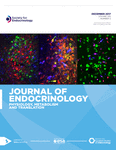Beyond the male sex hormone: deciphering the metabolic and vascular actions of testosterone
- Graduate Institute of Clinical Medical Sciences, Hormone Research Center, Kaohsiung Chang Gung Memorial Hospital, Chang Gung University College of Medicine, Kaohsiung, Taiwan
- Correspondence should be addressed to H-Y Kang; Email: hkang3{at}mail.cgu.edu.tw
Abstract
Among all the androgens that stimulate or control the development and maintenance of body composition, testosterone could be the most well known and important due to its linkage to many diseases, including the metabolic syndrome, type 2 diabetes, and cardiovascular disease. The detailed mechanisms of how testosterone functions in health and disease, however, remain unclear. During the past several decades, the successful cloning of the androgen receptor (AR) and its coregulators and establishment of AR transgenic and knockout animal models have led to rapid development in this field of study. The two thematic reviews in this issue of the Journal of Endocrinology provide a timely and useful guide and source of information to discuss the current knowledge of the metabolic and vascular actions of testosterone involvement in these androgen-related disorders. They described the mechanisms of relationships between testosterone and metabolic disease and how testosterone regulates vascular function and inflammation with a comprehensive summary of updated androgen-AR findings. As more research and clinical trials have put efforts into the study of how testosterone functions in these diseases, it is expected that the roles of testosterone and its actions will become clearer in the near future.
- Received in final form 10 February 2013
- Accepted 25 March 2013
- Made available online as an Accepted Preprint 25 March 2013
- © 2013 Society for Endocrinology











